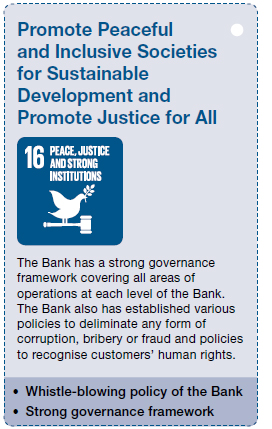
How We Create Value
Intangibles that Matter
Intellectual Capital


Intellectual capital is composed of intangibles associated with the Bank – culture, ethics, values, organisational knowledge, systems, procedures and brand value. These intangibles, while not reflected in the balance sheet, are indeed assets of the Bank. They permeate the Bank’s operations at all levels – whether it is high level decision-making or day-to-day functions. They also influence the perception our customers have of the Bank.
Recognition of Our Brand
With its 78 years history, the Bank of Ceylon is leading the banking sector in the country. Bank of Ceylon, is the “Bankers to the Nation”. The trust the nation has on us today has been built-up over this long period. We have been the partners of the Government, the business community and the general public in the nation’s economic growth. Being the largest bank in the country the power we have in transforming the life of our people for better is immense. We can be justly proud of the part we have played in improving the quality of life of so many. We respect all forms of diversity and do not discriminate on the basis of race, religion, sex or social background.
The unique cylindrical shape Head Office Building of the Bank situated in the heart of Colombo has an iconic value. Also the logo of the Bank and the Bank song has registered in minds of millions, symbolising the strength of our brand. The Bank of Ceylon received several accolades related to its brand value during the year under review. For the ninth consecutive year we were recognised as the No.1 Sri Lankan Brand by Brand Finance Sri Lanka, which is the Sri Lankan partner of Brand Finance, UK. The award estimated the brand value at LKR 40.6 billion. The Bank was again honoured as the best Sri Lankan brand at the “Interbrand Best Sri Lankan Brands” convention conducted by Interbrand, one of the world’s most influential brand consulting agency. This award was based on multiple criteria including the financial performance of the brand and its role in influencing the customer’s choice. In 2017, we have invested a sum of LKR 1.2 billion on marketing activities, which is essentially an investment in our brand. The Bank of Ceylon has been consistently rated among the top 1000 Banks in the world since 2012.
Imparting Our Values
High ethical standards and values are inbuilt into the Bank’s culture. The core values of the Bank are inculcated into employees at all levels. Since customer service is a key business process, this is also a prime consideration in staff training. Our staff need to be courteous and responsive to the needs of the customer. In our training programmes we give a great deal of importance to training on customer service. Our customer base is extremely diverse ranging from the largest corporates to small scale rural entrepreneurs and also from high net-worth clients to marginalised communities in rural hideouts. In this context, providing a seamless customer service makes it necessary that our staff be customer-centric. They need to be able to empathise with the customer and amidst such diversity, deal with each customer appropriately.
The Bank maintains a continuous focus on agility and innovation. We invest in digital delivery channels, process modification and workflow simplification through automation and digitisation. Business processes are being reviewed and re-engineered on an ongoing basis and new developments introduced. The technological transformation has been complemented with an organisational transformation by creating dedicated divisions with specialised knowledge. To add value to our products and services and streamline our workflow,
a document management system has been implemented. The Research Division along with Product and Banking Development Division also actively contribute in new products and service development. Employees are always encouraged to contribute their ideas for product, service and process improvement.
Governance
The Bank’s values and ethics are reflected in its governance structure and its systems, procedures and decision-making. We are committed to a high level of ethics, governance and professionalism and consider ourselves to be accountable for all our actions. The Bank is always cognisant of its responsibility to safeguard the nation from activities such as money laundering and terrorist financing. Organisational procedures, backed by committees dealing with various relevant aspects, reinforce this commitment. With our role as a custodian of our depositors’ funds, we need to exercise due care in all our activities. Risk is inherent in banking operations. However, we always endeavour to minimise any risk to our depositors with highly professional risk management procedures. Mechanisms are also in place to ensure that policies and procedures drawn up are rigorously implemented. Another safeguard we have is our whistle-blowing policy, where employees and non-employees can come forward to report any instance of corruption, money laundering, fraud and any other unethical or illegal transactions. This policy ensures the privacy and also safeguards all the parties who raises the issue.
The Bank always promotes collective decision-making although the responsibility lies individually, almost all the decisions of the Bank are taken on a collective basis. The decision-making authority given to a single person is limited. Hence, this ensures greater transparency and reduces the possibility of fraud or corruption.
(Refer Corporate Governance for further details).
The cumulative service experience of our staff amounts to 81,841 years. In addition 1,336 employees have been in the service of the Bank for over 20 years. This demonstrates the wealth of experience in our human capital. Staff is given rewards commensurate with the knowledge and qualifications they have acquired. Our staff, through the learning experiences they gain while performing their duties, will also build-up a body of tacit knowledge.
Our Organisational Learning
In the present day business environment, a knowledge base forms an important intangible asset of any organisation. Knowledge resides both in the collective knowledge of the Organisation and the knowledge of the individual staff. The Bank is a learning Organisation and it is continuously defining its organisational structures, systems and procedures through learning experiences.
At the level of employees, building the knowledge and skills of our staff is one of our key strategies. We ensure that all our employees receive the training they need to fulfil their responsibilities.
The cumulative service experience of our staff amounts to 81,841 years. In addition 1,336 employees have been in the service of the Bank for over 20 years. This demonstrates the wealth of experience in our human capital. Staff are given rewards commensurate with the knowledge and qualifications they have acquired. Our staff, through the learning experiences they gain while performing their duties, will also build-up a body of tacit knowledge. Over time, through the contributions they make towards developing the policies, systems and procedures of the organisation this tacit knowledge will be transformed into institutionalised knowledge. Thus the learning process becomes a vehicle of value creation, both in the short and long term.
Disseminating the Knowledge
The experience of our Corporate Management members range from 20 to 38 years in diverse fields of the banking industry. Hence, the blend of knowledge and the experience they collectively bring is immense. Through well planned talent management processes and delegation of responsibilities, executed in a timely manner, these Key Management Personnel, develop the second line of leaders. Through this process they disseminate their knowledge and experience down the line.
The Bank is in the process of imparting the knowledge to its new employees via spot tests conducted to all staff and also through various knowledge-sharing lecture notes and newsletters circulated via an e-Learning platform.
Effective and novel learning methods have also been introduced in the new corporate plan to institutionalise the experience and knowledge that lies within individuals. Our values, culture, ethics and organisational knowledge when blended with our brand recognition places us well ahead in the industry in terms of institutional capital.




